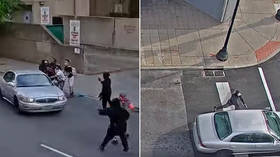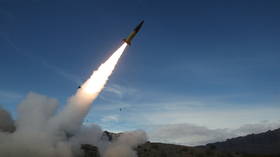#DefundNPR trending after NPR illustrates story on ‘right-wing extremism’ with footage of driver hitting ‘protester’ after assault

National Public Radio has come under fire after it illustrated a story on right-wing attacks with footage from an incident in which a car knocked down a man after the driver was attacked through the window.
#DefundNPR was trending in the US part of the Twittersphere on Sunday evening after the non-profit media outlet, partially funded by the US government, ignited outrage from conservatives for using a seemingly misleading cover photo to promote a story alleging a surge in attacks by “right-wing extremists” using vehicles to ram into protesters.
An initial version of the story, titled “Vehicle Attacks Rise As Extremists Target Protesters,” featured an image from footage showing a group of about a dozen people surrounding an SUV. One person can be seen standing in front of the car, as if almost leaning against the hood.
Also on rt.com Horrific video of cop rammed by car in New York emerges amid anti-police-brutality unrestIt did not take long for internet sleuths, however, to point out that the cover pic, which was supposed to serve as an example of right-wing violence against peaceful protesters, has a controversial backstory to it.
The surveillance footage from the scene, the source of the photo in question, shows a protester standing with a megaphone right in front of the vehicle, blocking the road.
Here's a fuller video of what you're calling a "right-wing extremist attack" ... a driver is harassed by a group of people, tries to get away, is then attacked by a larger group... and uses their vehicle to defend themselves and get away.This story is leftist bullshit. pic.twitter.com/771gEebiqg
— Tim Young (@TimRunsHisMouth) June 21, 2020
As the driver apparently refuses to back down, a verbal altercation follows and a group of people harasses the driver through the open window.
The incident, which took place on Wednesday in Louisville, Kentucky, was covered by local media. Local police told WAVE 3 News that one of the “protesters” ripped off one of the female driver’s dreadlocks during the showdown. The woman told officers that it was not until one of the attackers pointed a gun at her that she decided to flee, claiming she ran over a protester who stood in her way by accident.
Additional footage shows an individual chasing the vehicle with a gun.
.@lmpd has released this video from this morning where a car hit a protestor at 6th and Liberty and as they were leaving the area, a protestor pulls a gun on the car. #LMPD is searching for the driver. @TalkRadio1080@840WHAS#Louisvillepic.twitter.com/vxvELzCmdh
— Will Clark (@WClark840WHAS) June 17, 2020
In the aftermath of the incident, police charged two persons involved in the attack with rioting, disorderly conduct, and obstructing a highway. The man, who is believed to be the gun-toting protester in the video, was identified as Darius Anderson, 21. He has also been charged with 1st degree wanton endangerment. No charges have been filed against the driver so far.
Shortly after NPR ran the article, conservative pundits pounced on it, accusing the broadcaster of intentionally spinning the story and smearing the victim.
Vehicles and drivers inside are viciously attacked by violent leftist radicals.Drivers mow the bastards down to escape the attack. NPR writes the most dishonest, phoney story in media history in response to the attacks. #DefundNPRhttps://t.co/ACLXKzDwPq
— David Wohl (@DavidWohl) June 21, 2020
“You falsely accused a crime victim of being a terrorist. Enjoy the lawsuits!” political commentator Mike Cernovich wrote.
“This driver needs to get a lawyer and sue NPR,” Stephen L. Miller, host of the Versus Media Podcast, who has also contributed to Fox News and several other media outlets, wrote.
This driver needs to get a lawyer and sue NPR. https://t.co/t6h7aJDqDx
— Stephen L. Miller (@redsteeze) June 21, 2020
Responding to the backlash, NPR replaced the cover photo and issued an editor’s note, saying that the photo originally chosen to illustrate the piece “does not appear to be an example of the assaults described in the story.”
“Police have not charged the driver, but have charged two of the protesters involved in that incident,” it said.
Note: A previous version of this post and story included a photo of a protester being struck by a car in Louisville, Kentucky. The photo, chosen by editors, does not appear to be an example of the assaults described in the story, and has been replaced. pic.twitter.com/mDIzyoLmPO
— NPR (@NPR) June 21, 2020
Many critics, however, are not satisfied with NPR’s response, calling it out for pretending they did nothing wrong and urging the station to issue an apology.
NPR deleted their tweet, kept the article up, shifted the picture to Charlottesville (which is all the evidence they have of their claim), and pretended they didn't do anything wrong in their "Editors note"https://t.co/XRAszmTEk7pic.twitter.com/wmIf5ypdUC
— Tim Young (@TimRunsHisMouth) June 21, 2020
Vehicles and drivers inside are viciously attacked by violent leftist radicals.Drivers mow the bastards down to escape the attack. NPR writes the most dishonest, phoney story in media history in response to the attacks. #DefundNPRhttps://t.co/ACLXKzDwPq
— David Wohl (@DavidWohl) June 21, 2020
Some, however, say the calls to defund NPR make little sense. While during the 1970s and early 1980s, NPR was mostly funded by the federal government, government funds account for only a fraction of its budget now.
I’m an active listener of NPR and anyone who does knows they are privately funded. They have fund raisers everytime the season changes. #DefundNPRpic.twitter.com/Y79QTbNjpS
— ᵖʳᵒᵛᵉʳᵇ ①③①② (@k4rm4_1312) June 21, 2020
Think your friends would be interested? Share this story!













